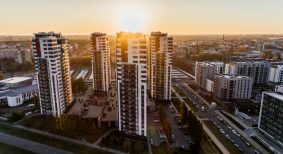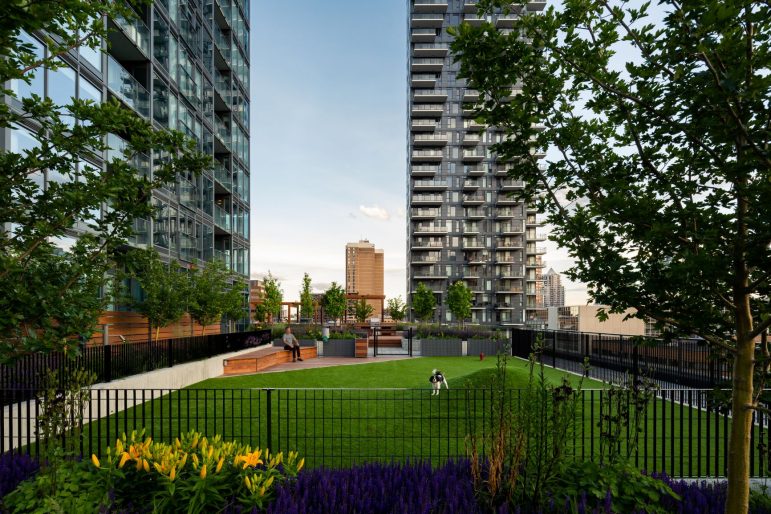The COVID-19 pandemic has changed much in facility management and maintenance. Some of the most recognized shifts have been in the enhancing of cleaning and infection control measures and the increased recognition of work done by cleaning and maintenance staff. Of equal importance is how building operators communicate that work transparently and demonstrate their health promotion certifications.
The Center for Active Design (CfAD) and its Fitwel® certification system has been leading the way for several years on improving health and wellness in commercial real estate. Fitwel is the world’s leading certification system committed to building health for all®, which uses research and evidence-based strategies to optimize and support the health of building occupants. CfAD works closely with the U.S. Centers for Disease Control and Prevention (CDC), which originally developed the Fitwel standard and remains a primary research partner.
Launched in 2017, Fitwel’s core focus is to ensure that health is a priority in the real estate sector, validated by measurable results. Fitwel can be used across a range of existing and new facilities including commercial office spaces, multifamily residential, retail, commercial sites, and mixed-use community sites.
Rising demand
Fitwel has a significant and expanding footprint in Canada — accelerated by COVID-19. Reena Agarwal, CfAD’s Chief Operating Officer, notes that given what has happened over the last 16 months, everyone now feels more of a personal relationship with health, and that has had a marked impact on both facility managers and owners as well as tenants and occupants.
Between 2019 and 2020, there was a rise of 640 per cent in the use of the Fitwel certification system — a marked increase from its previous year-on-year growth. Since 2017, Fitwel has had an impact on more than 1.3 million people through 2,300+ registered projects and 830+ projects certified or in review. In Canada, there was 144 per cent growth between 2019 and 2020, and that demand is being driven largely by tenants.

Fitwel & CfAD COO Reena Agarwal
“Tenants want to know how the buildings they are in — or will soon be occupying — are aligned with their health priorities,” notes Agarwal. “This includes mitigating the risk of transmission of COVID-19 and other contagious diseases within the property.” In response, building managers are not only looking to ensure their protocols are up to date and aligned with science, but also that they are verified by a respected third party like CfAD. “Building managers want to be able to pass on that information to their stakeholders, whether they are tenants, employees, investors, or owners.”
Over the last four years, Fitwel’s mandate has progressed from educating the market on the connection between design and health to using its critical mass of data to provide detailed metrics and strategies on how to measure and elevate ESG and health within buildings. Facilities can reap financial rewards: the Massachusetts Institute of Technology published research in December 2020 using Fitwel data that showed that managers of properties with a healthy building certification can charge, on average, approximately 4.5 to 7 per cent higher rents than for non-certified properties.
Collaborating with QuadReal
One of Fitwel’s significant proponents is QuadReal Property Group.
QuadReal is a global real estate investment, operating and development company headquartered in Vancouver. It manages and develops a range of facilities including office, multi-unit residential, retail, and industrial, and began collaborating with Fitwel in 2018.

QuadReal Director of Sustainability Nisha Agrawal
Nisha Agrawal, Director of Sustainability, explains that Fitwel’s certification allowed QuadReal to expand its offerings and programming in health and wellness, a long-term goal of hers at the company. “Everybody is measuring energy, water, waste, greenhouse gases — and that’s important — but the health and wellness of your occupants is a crucial aspect that keeps your occupants happy in your spaces,” Agrawal explains.
The Fitwel collaboration was a natural extension for QuadReal. “We knew health and wellness was going to be critical in the coming years, even before the pandemic,” Agrawal adds. “We knew we needed to find a way to differentiate our buildings and spaces for tenants who often have lots of options, as well as to get ahead of the next trend.”
QuadReal has found Fitwel to be very valuable both to its organization and, by extension, to its tenants and residents. But another positive factor has been the level of collaboration between the two companies.
Educating via the Viral Response Module
QuadReal was one of the first companies to achieve certification using Fitwel’s Viral Response Module (VRM), developed during the pandemic. The VRM collates the best public health science and literature available about how to mitigate the risk of contagious disease spread within buildings. It also outlines best practices on how to communicate that information widely and transparently during a time when tenants are experiencing greatly increased levels of stress and anxiety.
“I like to tell owners that they’re not seeing the true full impact of, say, an air quality strategy unless they’re communicating what that strategy is to their tenants, visitors, and others,” Fitwel’s Agarwal says. “It’s one thing to put something in place; it’s another thing to be transparent about what that intervention is. There’s science that speaks to the fact that if you’re communicating transparently about your plans, visitors and occupants in your building will feel a greater sense of trust, security, and safety in coming back into that space.”
She adds that the demand for the VRM reflects the fact that health and wellness has moved from being seen as a “nice-to-have” to a “must-have” for real estate properties. While not everyone has a full understanding of what health and wellness in facilities entails, the level of awareness has been raised in light of COVID-19.
From a facility management perspective, QuadReal’s Agrawal adds that the pandemic has prompted tenants and occupants to want to know about things like air quality and the specifics of maintaining cleanliness in buildings — things that hadn’t been top of mind before COVID-19. “The VRM and QuadReal’s work with Fitwel gives us another opportunity to engage with tenants. Focusing on things like air quality isn’t new for us, we just never talked about it in the way we are doing now.”
Fitwel and QuadReal have also worked together on a resource called the Office Guide to Building Health. The guide aims to help educate and inform landlords and tenants about their roles and responsibilities, and what they can do individually and collaboratively to optimize the health of all occupants.
Looking ahead
Agarwal and Agrawal were presenters at the 2021 Virtual REMI Show on June 16, where they educated viewers on health and wellness within buildings and the benefits of Fitwel. Agarwal notes that Fitwel was proud to be a platinum sponsor of the show. “Fitwel has a proven track record as a provider of information on what’s new, innovative, and impactful within the industry in terms of health and well-being. We’re proud to be sponsors of the REMI Show in support of these efforts.”
Looking ahead, Agarwal adds that in addition to the primary goals of greater adoption and impact in the Canadian market, Fitwel and CfAD hope to bring on board additional industry leaders such as QuadReal. Ultimately, Fitwel wants to be the leading source of information on health and wellness for the Canadian real estate industry.
“The industry is looking for greater leadership in health-based metrics,” concludes Agarwal. “We want to fill that role to help companies understand how health and wellness positively impacts their business strategies, and their tenants and occupants.”
Fitwel and QuadReal at the 2021 REMI Show
Watch the 2021 Virtual REMI Show session hosted by Reena Agarwal and Nisha Agrawal on-demand: Accelerating the Healthy Building Movement in Canada With Fitwel and QuadReal








